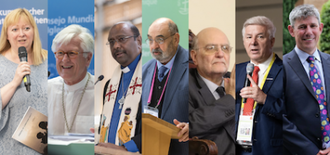Cries of despair - WCC media briefing on digital visit to Holy Land

Image: WCC
Source: WCC
The World Council of Churches (WCC), accompanied by partners from the Middle East Council of Churches, ACT Alliance, and Caritas Internationalis, released a video media briefing on a recent ecumenical solidarity visit to the Holy Land held online on 7-8 August. The visit served as an opportunity to accompany member churches and ecumenical partners, listen to their voices and perspectives, amplify their calls, and remind the world of what is needed to bring about peace in the region.
Members of the delegation shared their perspective on the visit, and also clarified what they believe is an urgent call to the world to act now for peace in the Holy Land.
WCC general secretary Rev Prof Dr Jerry Pillay and the rest of the delegation all expressed regret that an in-person visit to the Holy Land, originally scheduled for 5-9 August, was postponed-but reiterated that the online solidarity visit still gave them a deeper, more profound understanding of local churches and people.
"Our intention was really to visit Gaza, given the realities of the situation there," said Pillay. "One of the deepest impressions on me in this visit was the conversations with the people who are working in Gaza. I think this created a deeper understanding of what was taking place. The world needs to stop, to listen, and the international communities need to respond more. It was deep, profound, and powerful in terms of realizing the need to get involved-and to get involved with significant change."
Dr Michel Abs, general secretary of the Middle East Council of Churches, described the visit as one founded in love with a message of hope.
"This is a sign of solidarity, a sign of love from the international community towards the people of the area who have been suffering for a long time," he said. "This visit is done by people of faith and of love who are coming to bring hope to the people who sometimes are not seeing any more horizon for the future."
Alistair Dutton, Caritas Internationalis secretary general, said that the conversations during the visit were sobering. "We can't talk about their homes anymore-they left those long ago and now they are just moving from place to place in the Gaza Strip," he said. "The level of human suffering is outrageous."
Dr Audeh Quawas, member of the WCC central committee and executive committee, said the visit sent the message that people are still feeling what Palestinians are suffering.
"Peace must prevail-and peace must prevail according to international law," he said. "It's time and it's enough-and it's more than enough-killing all those innocent people."
Rudelmar Bueno de Faria, general secretary of the ACT Alliance, said he was deeply moved by the shared experiences and local voices. "The challenges they face are numerous and deeply interconnected," he said. "All of this is rooted in an unbelievable lack of humanity that perpetuates a long and illegal occupation of the occupied territories of Palestine. One of the most pressing challenges, I realize, based on our conversations, is the impact of disproportional warfare."
Bishop Dr Heinrich Bedford-Strohm, WCC moderator, said the visit was an important opportunity for the voice of not only Christianity-but humanity.
"We have seen and heard so many stories of suffering in these two days," he said.
"It's a matter of faith," he added, remembering the cry of despair that Jesus uttered as Jesus died on the cross from acts of violence. "I heard this cry of despair in the stories that we have heard in these two days," he said.
The pastoral solidarity visit to the Holy Land took place online on 7-8 August 2024. The delegation included Bishop Dr Heinrich Bedford-Strohm, moderator of the World Council of Churches; Rev. Prof Dr Jerry Pillay, general secretary of the WCC; Dr Audeh Quawas, member of the WCC central committee and executive committee; Dr Michel Abs, general secretary of the Middle East Council of Churches; Erik Lysén, moderator of the ACT Alliance; Rudelmar Bueno de Faria, general secretary of the ACT Alliance; Alistair Dutton, Caritas Internationalis secretary general.
WCC staff accompanying the delegation: Rev Dr Kenneth Mtata, programme director; Carla Khijoyan, programme executive; Yusef Daher, coordinator Jerusalem Liaison Office, Marianne Ejdersten, director of communication with members from WCC Communication; Albin Hillert, Dr Marcelo Schneider; Susan Kim and communicators from MECC, ACT Alliance, ACT Church of Sweden, Caritas Internationalis, and the Jerusalem Patriarchate.


















